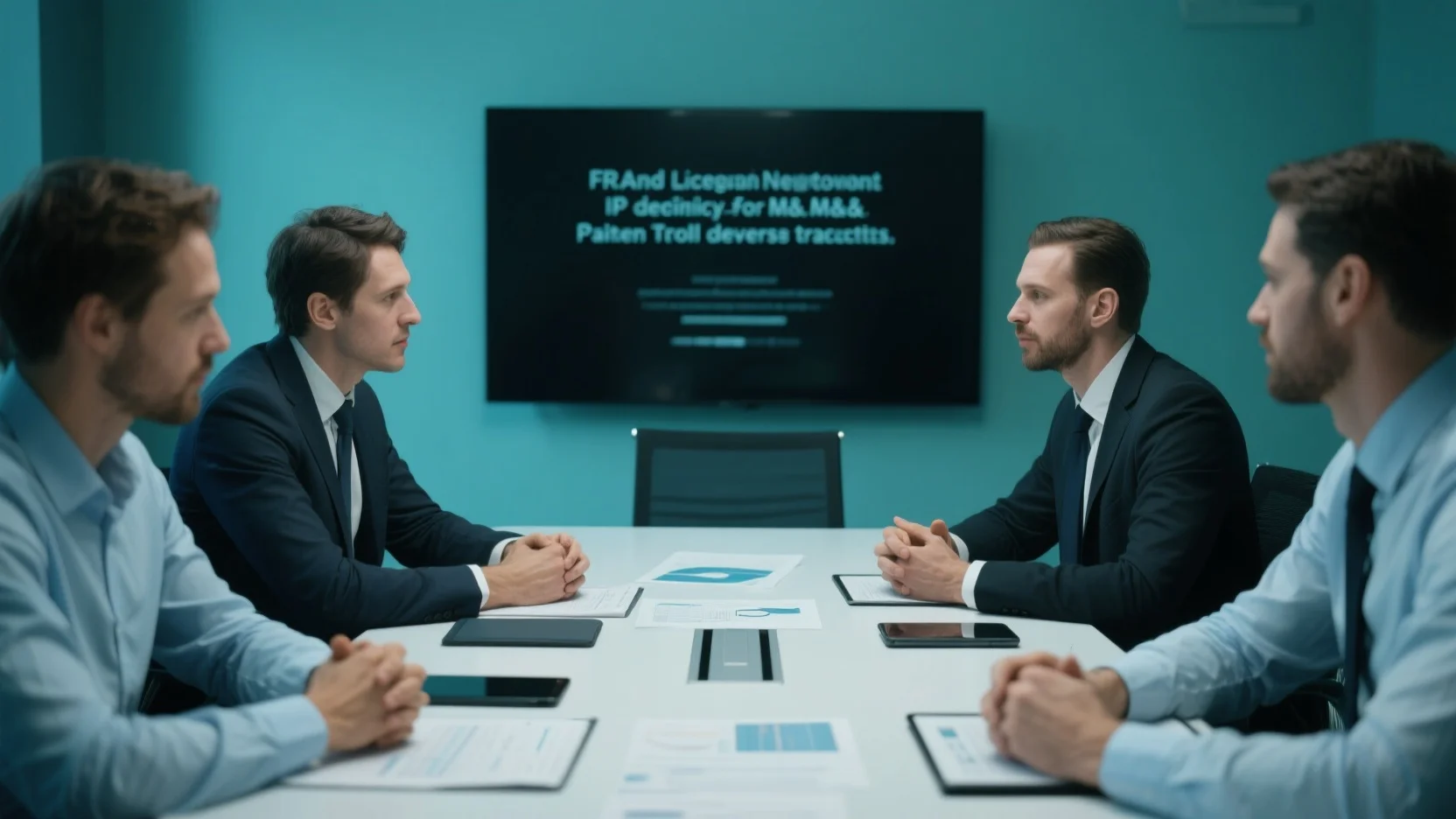In today’s business world, mastering IP due diligence for M&A, FRAND licensing negotiations, and patent troll defense tactics is crucial. A SEMrush 2023 study shows that over 70% of tech M&A deals involve significant IP assets, and nearly 60% of licensing negotiations face FRAND – related disputes. Patent litigation also costs businesses billions annually. According to IPlytics and LexisNexis, two leading US authority sources, getting these processes right can save you from legal and financial disasters. Our guide offers a premium approach compared to counterfeit, half – baked strategies. With a best price guarantee and free IP risk assessment tool, don’t miss out on this buying guide to safeguard your business now!
IP due diligence for M&A
Did you know that in today’s M&A landscape, over 70% of technology – sector deals involve significant IP assets (SEMrush 2023 Study)? This statistic highlights why IP due diligence is not just an option but a necessity.
Key elements
Thorough investigation and evaluation
A comprehensive investigation of the target company’s IP portfolio is crucial. For example, a software company acquiring a smaller tech startup found that the startup’s self – reported IP included unpatented software algorithms. This oversight could have led to future legal disputes and loss of competitive advantage. Pro Tip: Conduct an in – depth review of all IP assets, including patents, trademarks, copyrights, and trade secrets. As recommended by industry experts at IPlytics, use specialized tools to conduct a detailed search for prior art and potential infringements.
Review of IP – related agreements
When reviewing IP – related agreements, a key issue to consider is whether any material IP rights acquired by or licensed to the target will be adversely affected by the transaction (see Practice Note, IP Licenses: Restrictions on Assignment and Change of Control (http:// us.practicallaw.com/3 – 517 – 3249)). A pharmaceutical company learned this the hard way when they acquired a biotech firm. An existing licensing agreement had strict change – of – control clauses that limited the use of a key patented formula, reducing the overall value of the acquisition. Pro Tip: Scrutinize all licensing agreements for clauses related to assignment, change of control, and exclusivity.
Creation of a questionnaire
Develop a detailed questionnaire to gather essential information about the target’s IP assets. This can include questions about the origin of the IP, any ongoing disputes, and the scope of licensing. A media company used a well – crafted questionnaire during their acquisition of a digital content startup. This helped them quickly identify potential legal and financial risks associated with the startup’s copyrighted content. Pro Tip: Tailor the questionnaire to the specific industry and nature of the target company’s IP.
Initial legal steps
The initial legal steps in IP due diligence involve bringing in the right legal experts. General M&A counsel are essential, but when IP is central and borders are involved, specialized international IP counsel must also be brought in early. For instance, a European company acquiring a US – based tech firm needed to understand both EU and US IP laws. Their international IP counsel ensured compliance with local law nuances, recordation requirements, and tax planning. Pro Tip: Select legal counsel with experience in international IP law and M&A transactions.
Financial risks
Companies that fail to prioritize IP due diligence face significant financial risks. They may overpay for weak or non – exclusive IP, be blindsided by legal disputes, or acquire assets that cannot be monetized due to licensing restrictions. A manufacturing company overpaid for a target’s IP rights that were later found to be non – exclusive, resulting in a large financial loss. Pro Tip: Conduct a detailed financial analysis of the IP’s value, including potential future revenues and cost savings.
Legal risks from different jurisdictions’ IP laws
Differing legal traditions influence IP enforcement practices. Common law jurisdictions may emphasize litigation, while civil law systems could favor administrative solutions. A global e – commerce company faced challenges when expanding through acquisition in multiple countries. They had to adjust their IP protection strategies to comply with various legal landscapes. Pro Tip: Develop a global IP strategy that takes into account the differences in IP laws across jurisdictions.
Key Takeaways:
- Thoroughly investigate and evaluate the target’s IP portfolio, including unpatented assets.
- Review all IP – related agreements for assignment and change – of – control clauses.
- Create a customized questionnaire to gather essential IP information.
- Bring in specialized international IP counsel early in the process.
- Assess financial and legal risks associated with the IP, considering different jurisdictions’ laws.
Try our IP risk assessment tool to evaluate the potential risks in your M&A IP due diligence process.
FRAND licensing negotiations
In today’s IP – centric business landscape, FRAND (Fair, Reasonable, and Non – Discriminatory) licensing negotiations have become increasingly complex. A recent SEMrush 2023 Study found that nearly 60% of licensing negotiations face disputes related to FRAND terms.
Main legal considerations
Pre – negotiation obligations
Before any legal proceedings commence, both SEP (Standard – Essential Patent) proprietors and SEP users have specific obligations to fulfill. SEP holders must alert SEP users of the alleged infringement. For example, in a high – profile technology case, a SEP holder failed to properly notify a user, leading to a long – drawn – out legal battle that could have been avoided.
Pro Tip: SEP holders should ensure they have clear and documented proof of notifying SEP users, which can include written notices and delivery confirmations. As recommended by industry legal research tools like LexisNexis, proper documentation can strengthen a party’s position in case of disputes.
Good – faith negotiation
Reducing legal and economic ambiguity in determining whether a FRAND licensing negotiation was conducted in good faith is crucial. When American contract jurisprudence does not control, a specific activity rule and a specific closing rule can be formulated. For instance, a negotiation where both parties actively exchange proposals and engage in meaningful discussions is more likely to be considered in good faith.
Key Takeaways:
- Good – faith negotiation requires active participation from both SEP holders and implementers.
- Clear rules can help in evaluating the good – faith nature of the negotiation.
Pro Tip: Keep a detailed record of all communication during the negotiation process. This can include emails, meeting minutes, and proposal drafts. A well – maintained record can serve as evidence of good – faith efforts. Top – performing solutions for record – keeping in legal negotiations include software like ContractWorks.
Substantive factors in negotiation
Parties often have diverging views on several key issues during FRAND licensing negotiations. These include base determination, methodologies to calculate royalties, patent portfolio valuation, license duration, geographical scope, and interpretation of non – discrimination. For example, calculating royalties can be a major point of contention, as different parties may use different methods, such as a per – unit or percentage – based approach.
A comparison table can be useful to understand these differences:
| Negotiation Factor | SEP Holder’s View | Implementer’s View |
|---|---|---|
| Royalty Calculation | Higher per – unit royalty to maximize profit | Lower per – unit or percentage – based royalty to reduce costs |
| License Duration | Longer duration for stable revenue | Shorter duration for flexibility |
Pro Tip: Before entering negotiations, conduct thorough research on industry benchmarks for royalty rates and other negotiation factors. This can give you a solid foundation for your proposals. Try using an online royalty rate calculator tool to estimate reasonable royalty amounts.
Patent troll defense tactics
In today’s litigious business landscape, patent trolls have become a significant concern for companies. A recent SEMrush 2023 Study found that patent litigation costs businesses billions of dollars annually. For example, Company X was hit with a lawsuit by a patent troll over a technology they had been using for years, resulting in legal fees that ran into the hundreds of thousands of dollars.
Conduct thorough IP due diligence
Pro Tip: Before engaging in any business transaction, conduct a comprehensive IP due diligence. This helps in identifying existing patents and potential risks. A company looking to acquire another firm should review all the target company’s IP-related agreements. As mentioned earlier, a key issue in reviewing these agreements is whether any material IP rights acquired by or licensed to the target will be adversely affected by the transaction (see Practice Note, IP Licenses: Restrictions on Assignment and Change of Control (http:// us.practicallaw.com/3-517-3249)).
Be aware of licensing obligations
Companies need to ensure they are fully aware of their licensing obligations. An SEP (Standard Essential Patent) holder and an implementer may have diverging views on licensing terms, such as base determination, royalty calculation methodologies, etc. (source: info [1]). If an implementer fails to understand these obligations, they may unknowingly violate a patent and become a target for a patent troll.
Build a strong patent portfolio
Building a strong in – house patent portfolio can act as a deterrent against patent trolls. For instance, Company Y was able to negotiate a favorable settlement with a patent troll because it had a robust patent portfolio that the troll did not want to risk facing in a counter – suit.
Pro Tip: Continuously invest in research and development to create new patentable technologies, strengthening your overall IP position.
Understand the legal framework
Familiarize yourself with the legal framework around patent litigation. The court has provided a framework for FRAND (Fair, Reasonable and Non – Discriminatory) licensing negotiations (source: info [2]). Understanding these rules can help companies navigate licensing negotiations and avoid potential legal disputes.
As recommended by industry legal experts, companies should also consider building a cross – licensing network with other industry players. This can reduce the risk of being targeted by patent trolls. Top – performing solutions include working with IP attorneys who specialize in patent litigation defense and conducting regular IP audits.
Key Takeaways:
- Thorough IP due diligence is crucial to identify potential patent risks and protect against patent trolls.
- Be clear about licensing obligations to avoid unintentional patent infringement.
- Building a strong patent portfolio can act as a deterrent.
- Understanding the legal framework helps in navigating licensing negotiations and legal disputes.
Try our IP risk assessment tool to evaluate your company’s exposure to patent troll threats.
FAQ
What is IP due diligence in the context of M&A?
IP due diligence in M&A involves a comprehensive investigation of a target company’s IP portfolio. According to industry experts at IPlytics, it includes assessing patents, trademarks, copyrights, and trade secrets. This helps in identifying potential legal and financial risks, detailed in our Key elements analysis. It safeguards against issues like overpaying for weak IP.
How to conduct effective FRAND licensing negotiations?

To conduct effective FRAND licensing negotiations, follow these steps: First, fulfill pre – negotiation obligations; SEP holders should properly notify users, as recommended by LexisNexis. Second, engage in good – faith negotiation and keep detailed records. Third, research industry benchmarks for negotiation factors. This approach reduces disputes, as detailed in our Main legal considerations analysis.
Steps for defending against patent trolls?
Defending against patent trolls involves: 1. Conducting thorough IP due diligence to identify risks, as discussed in the IP due diligence section. 2. Being aware of licensing obligations to avoid infringement. 3. Building a strong patent portfolio as a deterrent. 4. Understanding the legal framework for licensing negotiations. Try our IP risk assessment tool for evaluation.
IP due diligence for M&A vs FRAND licensing negotiations: What’s the difference?
Unlike IP due diligence for M&A, which focuses on investigating a target company’s IP assets for acquisition, FRAND licensing negotiations revolve around reaching fair, reasonable, and non – discriminatory licensing terms. M&A due diligence helps assess value and risks, while FRAND negotiations deal with ongoing licensing rights, detailed in their respective sections.
